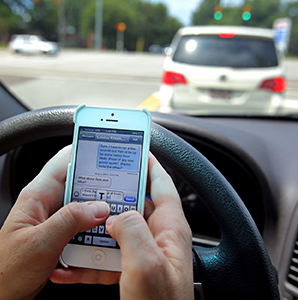
Distracted driving still a problem
Do you talk or text on your cellphone while driving? How about eating, fixing your tie, or putting on make-up? These are all activities that divert your attention from the road, and can be potentially deadly.
Distracted driving remains a problem in South Africa, and will continue to remain so into the future unless drastic action is taken. And, although that action needs to come from officials, more importantly, it has to start with a change of attitude among drivers.
In April, the Automobile Association (AA) hosted an event in Johannesburg to test driver’s ability when they are distracted.
We brought together a number of journalists to drive in simulators. Once comfortable with the simulators, we tested them without distractions, and then again with distractions. The results were alarming, and clearly indicated that when distracted, drivers’ reaction times are slower, and they are much more prone to crash.
At the event, journalists were sent sms messages and asked to respond, they were also asked to open and close a water bottle and were distracted by being engaged in simple conversation.
What we saw was that without distractions, the journalists were able to complete a lap of a racing circuit in fairly good times; times recorded for these laps averaged around 1.41 minutes, with hardly any crashes. However, with the distractions these lap times increased to 2.20 minutes, many of them with crashes or with cars spiralling out of control. Although not entirely scientific, the results point to the dangers of having your concentration averted from the road, even for a second.
But the problem is not purely with the cracking down on offenders who disobey regulations, specifically those who use electronic devices, or indeed other devices, when driving. Motorists who use these devices while behind the wheel need to change their attitudes, and take responsibility for their actions.
A driver who is talking on a cellphone, or texting while driving, needs to realise that their actions are not only irresponsible but also put the lives of other, law-abiding citizens in jeopardy. They can cause a crash that injures, or worse, kill, other people through their own reckless behaviour. No-one is immune the dangers of being distracted.
Although there are no current local statistics on how distracted driving causes crashes, there is sufficient anecdotal evidence to suggest this number is large enough to warrant urgent attention. Law enforcement against distracted drivers should be high on the agenda of road traffic officials, policing these offences beyond stopping motorists at on and off ramps for using electronic devices.
While there are many different distractions that constitute distracted driving, check yourself or your driver for any of these more prevalent activities:
Talking on cellphones, or texting while driving,
- Eating while driving,
- Putting on ties or other clothing while driving, or changing clothes when driving,
- Applying make-up while driving,
- Looking to the backseat to engage passengers, especially children,
- Setting GPS devices while moving, and,
- Searching for items in various areas of the car while driving
We urge all drivers to obey the laws, and above all, to be sensible when driving. Put your cellphone in the boot of your car before driving off, and put on your tie or make-up before you get going. If you use a GPS device, set the destination before embarking on your journey. Remember that if you don’t focus on the road, there is a 100 percent likelihood that you will not avoid a crash while you are distracted.
Driving is a task that requires 100% of your focus. Your safety is most literally in your hands, don’t blow it.
Reference
Subscribe
Back to posts
SAU PUBLISHED: June 2016